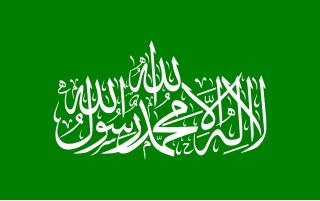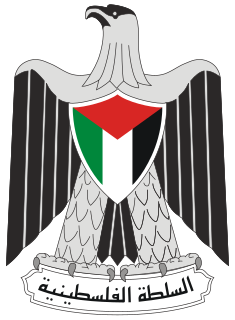
The Palestinian National Authority is the interim self-government body established in 1994 following the Gaza–Jericho Agreement to govern the Gaza Strip and Areas A and B of the West Bank, as a consequence of the 1993 Oslo Accords. Following elections in 2006 and the subsequent Gaza conflict between the Fatah and Hamas parties, its authority had extended only in areas A and B of the West Bank. Since January 2013, the Fatah-controlled Palestinian Authority uses the name "State of Palestine" on official documents.

The Palestinian government is the government of the Palestinian Authority or State of Palestine. Since June 2007, there have been two competing governments in the Palestinian territories, one in the West Bank and the other in the Gaza Strip. The government on the West Bank was generally recognised as the Palestinian Authority Government. On the other hand, the government in the Gaza Strip claimed to be the legitimate government of the Palestinian Authority. Until June 2014, when the Palestinian Unity Government was formed, the government in the West Bank was the Fatah-dominated Palestinian government of 2013. In the Gaza Strip the government was the Hamas government of 2012. Following two Fatah–Hamas Agreements in 2014, on 25 September 2014 Hamas agreed to let the PA Government resume control over the Gaza Strip and its border crossings with Egypt and Israel, but that agreement had broken down by June 2015, after President Abbas said the PA government was unable to operate in the Gaza Strip.

The Interior Ministry of the Palestinian National Authority is the branch of the Palestinian National Authority (PNA) cabinet in charge of the security and the statistics of the population of the Palestinian National Authority. The Palestinian Central Bureau of Statistics (PCBS) is a sub-branch of the Interior Ministry that has the responsibility for the population and economic statistics of the Palestinian territories. Since Hamas' takeover of Gaza, the position of the Interior Ministry within the Palestinian Security Services is unclear.

The Gaza–Israel conflict is a part of the wider Israeli–Palestinian conflict.
Al-Shifa Hospital, properly known as Dar Al-Shifa Hospital is the largest medical complex and central hospital in the Gaza Strip, located in the neighbourhood of North Rimal in Gaza City in the Gaza Governorate. The current director of the hospital is Dr. Medhat Abbas.
Events in the year 2008 in the Palestinian territories.

Egypt–Palestine relations are the bilateral relations between the Arab Republic of Egypt and the State of Palestine. Egyptian President Gamal Abdel Nasser was a strong supporter of the Palestinian cause and he favored self-determination for the Palestinians. Even today Egypt maintains strong relations with the Palestinian Authority and it favors peace between both Israel and Palestine.
Events in the year 2012 in the Palestinian territories.

The governance of the Gaza Strip is carried out by the Hamas administration, led by Ismail Haniyeh, from 2007, until 2014 and again from 2016. The Hamas administration is often referred to as the Hamas government in Gaza.
Events in the year 2013 in the State of Palestine.

The Palestinian Legislative Council (PLC) is the unicameral legislature of the Palestinian Authority, elected by the Palestinian residents of the Palestinian territories of the West Bank and Gaza Strip. It currently comprises 132 members, elected from 16 electoral districts of the Palestinian Authority. The PLC has a quorum requirement of two-thirds, and since 2006 Hamas and Hamas-affiliated members have held 74 of the 132 seats in the PLC.

The 2014 Israel–Gaza conflict also known as Operation Protective Edge and sometimes referred to as the 2014 Gaza war, was a military operation launched by Israel on 8 July 2014 in the Hamas-ruled Gaza Strip. Following the kidnapping and murder of three Israeli teenagers by Hamas members, the IDF conducted Operation Brother's Keeper to arrest militant leaders, Hamas fired rockets into Israel and a seven-week conflict broke out. The Israeli airstrikes and ground bombardment, the Palestinian rocket attacks and the ground fighting resulted in the death of thousands of people, the vast majority of them Gazans.
Reactions to the 2014 Israel–Gaza conflict came from around the world.

The Palestinian Unity Government of June 2014 was a national unity government of the Palestinian National Authority under Palestinian President Mahmoud Abbas formed on 2 June 2014 following the Fatah-Hamas Reconciliation Agreement that had been signed on 23 April 2014. The ministers were nominally independent, but overwhelmingly seen as loyal to President Abbas and his Fatah movement or to smaller leftist factions, none of whom were believed to have close ties to Hamas. However, the Unity Government was not approved by the Legislative Council, leading to its legitimacy being questioned. The Unity Government dissolved on 17 June 2015 after President Abbas said it was unable to operate in the Gaza Strip.
The following lists events that happened during 2016 in the State of Palestine.
The following lists events that happened during 2017 in the State of Palestine.














